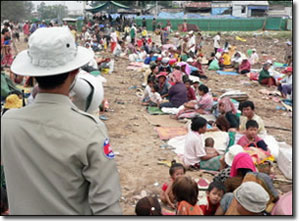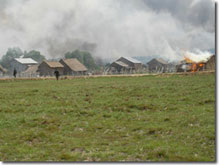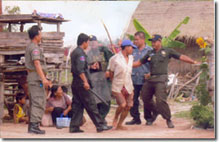
In Cambodia today, more than 150,000 people are threatened with eviction. Forty-five percent of the country's entire landmass has been sold off - including the land around Angkor Wat, expansive forested areas, the colonial buildings of Phnom Penh and islands off the south coast.
 People live on a large majority of this land and have lived on it for a long time. Their livelihood is often directly connected to where they live and all their social, physical and economic ties are settled around their homes. However, whatever legitimate possessory rights they may have to the land seem to matter very little when the military comes rolling in and burns up entire villages, loads everyone into trucks and drops them off in the middle of nowhere - relocating them in the name of "development". This eviction over a year ago of 84 families from a village in Sihanoukville on Cambodia's south coast is just one example.
People live on a large majority of this land and have lived on it for a long time. Their livelihood is often directly connected to where they live and all their social, physical and economic ties are settled around their homes. However, whatever legitimate possessory rights they may have to the land seem to matter very little when the military comes rolling in and burns up entire villages, loads everyone into trucks and drops them off in the middle of nowhere - relocating them in the name of "development". This eviction over a year ago of 84 families from a village in Sihanoukville on Cambodia's south coast is just one example.
The law is supposed to promote justice, and provide a structure that serves to protect peoples' rights and legal interests.... right? Yes. The land law in Cambodia however, has been used in direct contrast to all the good intentioned purposes that justify the existence of legal systems. As a law student I feel the need to defend on some level the legitimacy of the need for laws and a legal system, but sometimes the arguments seem weak in the face of the reality of how the law is being used - or not used.
 The 2001 Cambodian land law is used as a tool to legitimize land-grabbing by a rich and powerful elite. The relocation of thousands of people, entire communities and villages, is done in support of economic advancement and there is little that the average Cambodian can do to protect their right to the land. There are a number of NGOs working on this issue (the Center on Housing Rights and Evictions and Bridges Across Borders being the two that I am most familiar with), particularly recently as the number of people affected is rising consistently.
The 2001 Cambodian land law is used as a tool to legitimize land-grabbing by a rich and powerful elite. The relocation of thousands of people, entire communities and villages, is done in support of economic advancement and there is little that the average Cambodian can do to protect their right to the land. There are a number of NGOs working on this issue (the Center on Housing Rights and Evictions and Bridges Across Borders being the two that I am most familiar with), particularly recently as the number of people affected is rising consistently.  The focus of the work, as I understand it, is not to stop the evictions - a likely impossible task - but to ensure fair compensation and adequate relocation plans for those that are forced out of their homes to make way for five-star resorts and golf courses. The other focus of NGO work in this area is to stop the violence of the evictions which currently show blatant disregard for the welfare of those affected, and to help implement the law justly. The law should not be manipulated at the expense of the people.
The focus of the work, as I understand it, is not to stop the evictions - a likely impossible task - but to ensure fair compensation and adequate relocation plans for those that are forced out of their homes to make way for five-star resorts and golf courses. The other focus of NGO work in this area is to stop the violence of the evictions which currently show blatant disregard for the welfare of those affected, and to help implement the law justly. The law should not be manipulated at the expense of the people.
I only became aware of the issue of evictions, forced evictions and the importance of the right to housing over the last year. It is increasingly visible and has become a major focus on the community legal education work that Bridges Across Borders does in Cambodia. I am still shocked, even after a year here, at the heartless greed that leads to this continuing unabated throughout the country, and I still find myself stunned at the utter inability of the law to provide a safeguard or some form of justice for those affected.
To end on a positive note, there is indication that the support for advocacy and education on housing rights and the land law is having an effect. A network of local community organizers recently presented the first nationwide petitions to the UNOHCHR (Office of the High Commissioner for Human Rights) calling for a stop to the government practice of handing out 'economic land concessions' illegally to foreign firms and for the government to pass the anti-corruption law, which was drafted in 1994 and has still not been passed. The anti-corruption petition garnered over a million signatures across the country, showing a newly found will from the people of Cambodia to begin to use the legal system to their benefit.
Still, the will of the people seems to be derailed by the interests of the few, and as a aspiring social justice lawyer of the future as much as I hope that the legal system can prevail, I still see endless greed and corruption as an obstacle that will never cease to plague the ability of the law to work for those it is presumably meant to serve.
For more information and details on the Stop Evictions campaign, please click here.